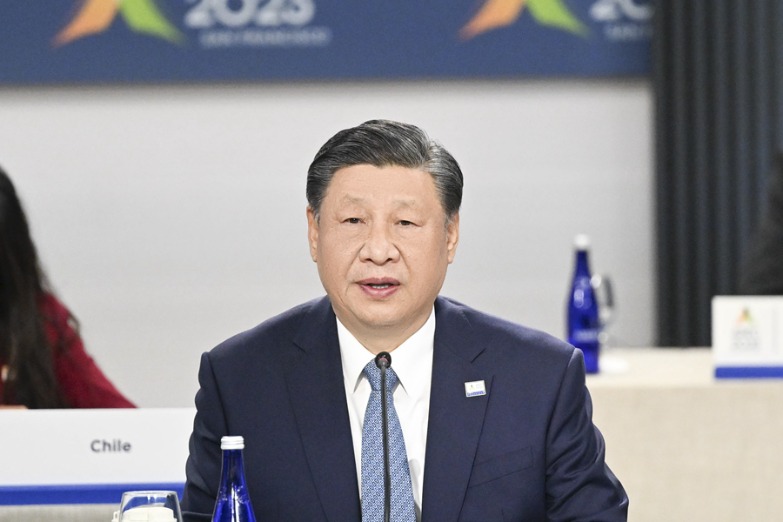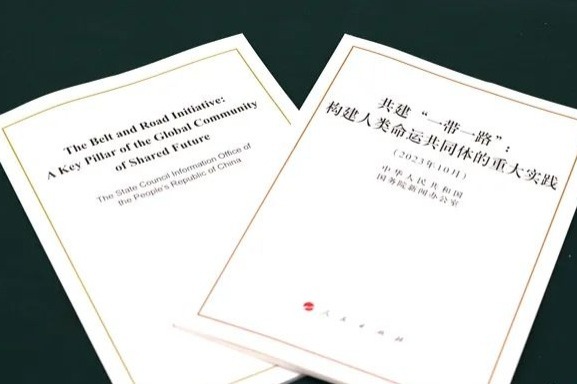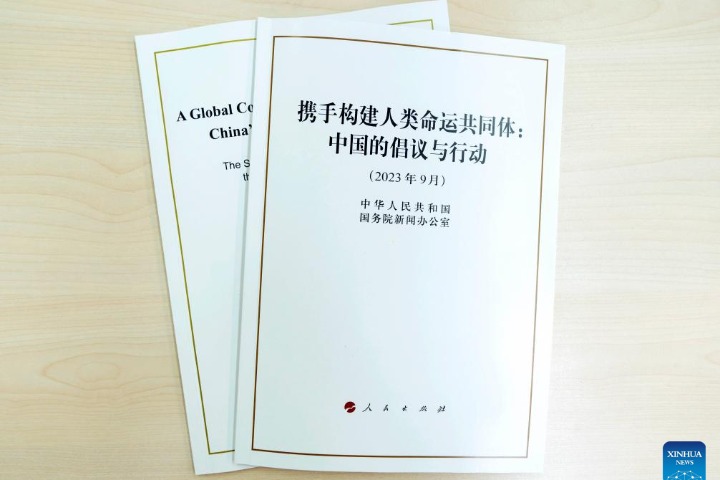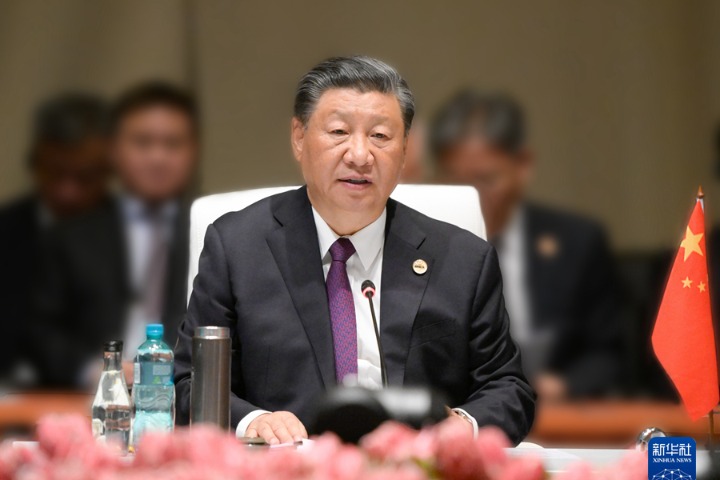金砖国家领导人第五次会晤德班宣言(中英对照)
新华网 2013-03-28 14:38

| 31、我们对中非共和国的当前形势和人员伤亡表示严重关切。我们强烈谴责针对平民的滥用暴力和侵犯人权行为。我们呼吁各方使人道主义行动安全和无障碍进行,并确保平民安全离境。我们呼吁冲突各方立即停止敌对行为,并重回谈判。我们愿与国际社会共同协助上述工作,并为和平解决冲突提供便利。巴西、俄罗斯、中国对南非和印度公民在中非遭受伤亡表示同情。 32、我们对刚果民主共和国正经历的动荡表示严重关切。我们欢迎2013年2月24日在亚的斯亚贝巴签署的《刚果民主共和国及地区和平、安全和合作框架》协议。我们支持刚果(金)独立、领土和主权完整。我们支持联合国、非盟和次区域组织为促进该国和平、安全和稳定所做出的努力。 33、我们重申强烈谴责任何形式的恐怖主义,强调无论如何均没有理由采取恐怖行动。我们认为根据《联合国宪章》和国际法相关原则和宗旨,联合国应在协调国际反恐行动中发挥核心作用。为此,我们支持落实联大全球反恐战略,决心在应对这一全球威胁方面加强合作。我们并再次呼吁应尽快完成《关于国际恐怖主义的全面公约》谈判,使其得到所有成员国批准,并同意朝这一目标共同努力。
34、我们认识并注意到互联网在促进全球经济、社会和文化发展中的重要积极作用。我们相信促进和参与和平、安全和开放的网络信息空间十分重要,强调通过全球认可的规范、标准和实践实现信息通信技术的安全使用至关重要。 35、我们祝贺巴西于2012年6月举办联合国可持续发展大会(里约+20),欢迎大会成果文件《我们憧憬的未来》中体现的成果,特别是重申里约原则,以及对可持续发展和消除贫困的政治承诺,并将为金砖国家的伙伴参与未来可持续发展目标的制定并就此开展合作创造机会。 36、我们祝贺印度主办的《联合国生物多样性公约》第11次缔约方大会暨《卡塔赫纳生物安全议定书》第六次缔约方会议的成果。 37、认识到气候变化是实现可持续发展面临的最大挑战和威胁之一,我们呼吁各方在卡塔尔多哈举行的《联合国气候变化框架公约》第18次缔约方大会暨《京都议定书》第八次缔约方会议通过决定的基础上,根据《公约》的原则和规定于2015年前完成一份适用于《公约》所有缔约方的议定书,其他形式的法律文件,或是一份具有法律效力的商定成果。 38、我们相信国际商定的发展目标,包括千年发展目标,回应了发展中国家的发展需求。这些国家继续面临发展挑战,包括普遍存在的贫困和不平等。低收入国家仍面临挑战,危及其近年来令人印象深刻的经济增长。粮食和其他大宗商品价格波动凸显了粮食安全问题并制约政府收入。重建宏观经济缓冲的进展相对缓慢,部分原因是有关国家需采取措施减轻外部冲击对社会的影响。由于财政缓冲有限和援助资金减少,许多低收入国家在抵御外部冲击时处于弱势,这将影响其在落实千年发展目标方面保持进展。我们重申,个别国家特别是非洲和其他的南方发展中国家无法自主实现千年发展目标,因此关于实现千年发展目标的全球发展伙伴关系第八项目标应在联合国系统的全球发展议程中处于核心地位。这进而要求我们信守在此前的主要国际会议成果文件中所做的承诺。 39、我们重申将共同致力于加快在2015年目标期限前实现千年发展目标,呼吁国际社会其他成员国为同一目标而努力。为此,我们强调2015年后的发展议程应基于千年发展目标框架,继续关注消除贫困和人的发展,同时在考虑发展中国家各自国情的条件下应对其他新挑战。为此,协助发展中国家获得执行手段这一关键问题应成为统领目标。重要的是,应确保关于联合国发展议程,包括“2015年后发展议程”的任何讨论,都应是在联合国机制下包容、透明的政府间磋商进程,以体现普遍性和基础的广泛性。 40、我们欢迎可持续发展目标开放工作组的成立,这符合里约+20大会通过的重申可持续发展原则是应对新挑战基础的成果文件。我们将致力于为讨论联合国发展议程建立协调的政府间磋商进程。 41、我们注意到为落实德里行动计划举办了下列会议: ·在新德里举办的安全事务高级代表会议 ·在联合国大会期间的外长会议 ·在华盛顿和东京举行的财长和央行行长会议 ·在巴亚尔塔港举办的贸易部长会议 ·在新德里和日内瓦举办的卫生部长会议 42、我们欢迎建立工商理事会和智库理事会,注意到为筹备本次领导人会晤举办了下列会议: ·第五届智库论坛 ·第四届工商论坛 ·第三届金融论坛 43、我们欢迎金砖国家财长和央行行长会议的成果,核准第三届金砖国家贸易部长会联合公报。 44、我们承诺为促进共同发展打造更强有力的伙伴关系。为此,我们通过德班行动计划。 45、我们同意下一轮领导人会晤的承办顺序原则上为巴西、俄罗斯、印度、中国和南非。 46、巴西、俄罗斯、印度和中国高度赞赏南非政府和人民在德班举办金砖国家领导人第五次会晤。 47、俄罗斯、印度、中国和南非对巴西提出主办第二轮领导人会晤首届峰会,即2014年金砖国家领导人第六次会晤表示感谢,并愿予以全力支持。 |
31. We are gravely concerned with the deterioration in the current situation in the Central African Republic (CAR) and deplore the loss of life. We strongly condemn the abuses and acts of violence against the civilian population and urge all parties to the conflict to immediately cease hostilities and return to negotiations. We call upon all parties to allow safe and unhindered humanitarian access. We are ready to work with the international community to assist in this endeavor and facilitate progress to a peaceful resolution of the conflict. Brazil, Russia and China express their sympathy to the South African and Indian governments for the casualties that their citizens suffered in the CAR. 32. We are gravely concerned by the ongoing instability in the Democratic Republic of the Congo (DRC). We welcome the signing in Addis Ababa on 24 February 2013 of the Peace, Security and Cooperation Framework for the Democratic Republic of the Congo and the Region. We support its independence, territorial integrity and sovereignty. We support the efforts of the UN, AU and sub-regional organizations to bring about peace, security and stability in the country. 33. We reiterate our strong condemnation of terrorism in all its forms and manifestations and stress that there can be no justification, whatsoever, for any acts of terrorism. We believe that the UN has a central role in coordinating international action against terrorism within the framework of the UN Charter and in accordance with principles and norms of international law. In this context, we support the implementation of the UN General Assembly Global Counter-Terrorism Strategy and are determined to strengthen cooperation in countering this global threat. We also reiterate our call for concluding negotiations as soon as possible in the UN General Assembly on the Comprehensive Convention on International Terrorism and its adoption by all Member States and agreed to work together towards this objective. 34. We recognize the critical positive role the Internet plays globally in promoting economic, social and cultural development. We believe it's important to contribute to and participate in a peaceful, secure, and open cyberspace and we emphasize that security in the use of Information and Communication Technologies (ICTs) through universally accepted norms, standards and practices is of paramount importance. 35. We congratulate Brazil on hosting the UN Conference on Sustainable Development (Rio+20) in June 2012 and welcome the outcome as reflected in "The Future we Want," in particular, the reaffirmation of the Rio Principles and political commitment made towards sustainable development and poverty eradication while creating opportunities for BRICS partners to engage and cooperate in the development of the future Sustainable Development Goals. 36. We congratulate India on the outcome of the 11th Conference of the Parties to the United Nations Conference on Biological Diversity (CBD COP11) and the sixth meeting of the Conference of the Parties serving as the Meeting of the Parties to the Cartagena Protocol on Biosafety. 37. While acknowledging that climate change is one of the greatest challenges and threats towards achieving sustainable development, we call on all parties to build on the decisions adopted in COP18/CMP8 in Doha, with a view to reaching a successful conclusion by 2015, of negotiations on the development of a protocol, another legal instrument or an agreed outcome with legal force under the Convention applicable to all Parties, guided by its principles and provisions. 38. We believe that the internationally agreed development goals including the Millennium Development Goals (MDGs) address the needs of developing countries, many of which continue to face developmental challenges, including widespread poverty and inequality. Low Income Countries (LICs) continue to face challenges that threaten the impressive growth performance of recent years. Volatility in food and other commodity prices have made food security an issue as well as constraining their sources of revenue. Progress in rebuilding macro-economic buffers has been relatively slow, partly due to measures adopted to mitigate the social impact of exogenous shocks. Many LICs are currently in a weaker position to deal with exogenous shocks given the more limited fiscal buffers and the constrained aid envelopes, which will affect their ability to sustain progress towards achieving the MDGs. We reiterate that individual countries, especially in Africa and other developing countries of the South, cannot achieve the MDGs on their own and therefore the centrality of Goal 8 on Global Partnerships for Development to achieve the MDGs should remain at the core of the global development discourse for the UN System. Furthermore, this requires the honoring of all commitments made in the outcome documents of previous major international conferences. 39. We reiterate our commitment to work together for accelerated progress in attaining the Millennium Development Goals (MDGs) by the target date of 2015, and we call upon other members of the international community to work towards the same objective. In this regard, we stress that the development agenda beyond 2015 should build on the MDG framework, keeping the focus on poverty eradication and human development, while addressing emerging challenges of development taking into consideration individual national circumstances of developing countries. In this regard the critical issue of the mobilization of means of implementation in assisting developing countries needs to be an overarching goal. It is important to ensure that any discussion on the UN development agenda, including the "Post 2015 Development Agenda" is an inclusive and transparent inter-Governmental process under a UN-wide process which is universal and broad based. 40. We welcome the establishment of the Open Working Group on the Sustainable Development Goals (SDGs), in line with the Rio+20 Outcome Document which reaffirmed the Rio Principles of Sustainable Development as the basis for addressing new and emerging challenges. We are fully committed to a coordinated inter-governmental process for the elaboration of the UN development agenda. 41. We note the following meetings held in the implementation of the Delhi Action Plan: . Meeting of Ministers of Foreign Affairs on the margins of UNGA. . Meeting of National Security Advisors in New Delhi. . Meetings of Finance Ministers, and Central Bank Governors in Washington DC and Tokyo. . Meeting of Trade Ministers in Puerto Vallarta. . Meetings of Health Ministers in New Delhi and Geneva. 42. We welcome the establishment of the BRICS Think Tanks Council and the BRICS Business Council and take note of the following meetings which were held in preparation for this Summit: . Fifth Academic Forum . Fourth Business Forumx . Third Financial Forum
43. We welcome the outcomes of the meeting of the BRICS Finance Ministers and Central Bank Governors and endorse the Joint Communique of the Third Meeting of the BRICS Trade Ministers held in preparation for the Summit. 44. We are committed to forging a stronger partnership for common development. To this end, we adopt the eThekwini Action Plan. 45. We agree that the next summit cycles will, in principle, follow the sequence of Brazil, Russia, India, China and South Africa. 46. Brazil, Russia, India and China extend their warm appreciation to the Government and people of South Africa for hosting the Fifth BRICS Summit in Durban. 47. Russia, India, China and South Africa convey their appreciation to Brazil for its offer to host the first Summit of the second cycle of BRICS Summits, i.e. the Sixth BRICS Summit in 2014 and convey their full support thereto. |

















 英语点津微信
英语点津微信 双语小程序
双语小程序